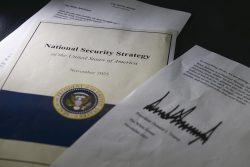15:13 JST, August 2, 2021
Beijing is tightening its control over China’s tech companies. As these fast-growing global corporations expand their influence to levels beyond the supervision of Chinese authorities, this is a sign of China’s vigilance.
Countries have the common challenge of how to regulate tech firms that have grown into behemoths through the possession of massive amounts of personal information and data, along with technological innovation.
Europe, the United States and Japan are also working to establish legislation to ensure that tech giants, including those collectively dubbed GAFA such as Amazon.com, Inc., do not abuse their dominant positions in business dealings or avoid taxation.
Because of Beijing’s opaque policymaking process and the fact that the law can be applied largely arbitrarily by the government, China’s regulations are fundamentally different from those of Japan, the United States and Europe, which aim to protect personal information.
China has fined Chinese tech giant Alibaba Group Holding Ltd. the equivalent of ¥300 billion for violating the anti-monopoly law by abusing its dominant market position. A planned IPO in China of an affiliate financial institution was thus postponed.
Fines for anti-monopoly violations had been at most in the tens of millions of yen, thus the amount exacted on Alibaba stands out. Company founder Jack Ma said last year, “Good innovation is not afraid of regulation,” and such remarks may have been interpreted as criticism of the Chinese government, drawing the severe punishment.
Chinese ride-hailing giant Didi Chuxing, in which Japan’s SoftBank Group Corp. has invested, was investigated by Chinese authorities, citing national security issues, shortly after its U.S. listing and had its app suspended. Details of the issues have never been released.
“Private enterprises must be one with the Chinese Communist Party,” Chinese President Xi Jinping has ordered. In mid-April, 34 Chinese tech giants released a document pledging to be “willing to obey regulations by the government and society.”
It can be said that the situation is now clear that Beijing has a system under which it effectively controls domestic tech companies in order to use them and their data for its governance.
Rules that go too far can deprive companies of their competitiveness. The United States is among the countries that have already started cutting off business with Chinese companies for fear of technology leaks. The Xi administration has touted a strategy to catch up with the United States in science and technology, but it will probably face a huge hurdle at some stage.
Control under one-party rule is incompatible with the values of Japan, the United States and Europe, which attach importance to a free economy, the rule of law and proper procedures. Xi should realize that there are limits to how much he can do by making light of economic and financial rules.
Foreign companies operating in China are also facing tighter controls. Japan, the United States and European countries must show their strong opposition to unjust regulations.
— The original Japanese article appeared in The Yomiuri Shimbun on Aug. 2, 2021.
"Business" POPULAR ARTICLE
-

Japan Govt Adopts Measures to Curb Mega Solar Power Plant Projects Amid Environmental Concerns
-

Core Inflation in Tokyo Slows in December but Stays above BOJ Target
-

Major Japan Firms’ Average Winter Bonus Tops ¥1 Mil.
-

Bank of Japan Considered U.S. Tariffs, Coming Shunto Wage Hike Talks in Its Decision to Raise Interest Rates
-

Institute: 2026 Condo Supply in Tokyo Metropolitan Area Forecast to Increase by 2.2%
JN ACCESS RANKING
-

Japan Govt Adopts Measures to Curb Mega Solar Power Plant Projects Amid Environmental Concerns
-

Core Inflation in Tokyo Slows in December but Stays above BOJ Target
-

Major Japan Firms’ Average Winter Bonus Tops ¥1 Mil.
-

Bank of Japan Considered U.S. Tariffs, Coming Shunto Wage Hike Talks in Its Decision to Raise Interest Rates
-

Tokyo Zoo Wolf Believed to Have Used Vegetation Growing on Wall to Climb, Escape; Animal Living Happily after Recapture




























